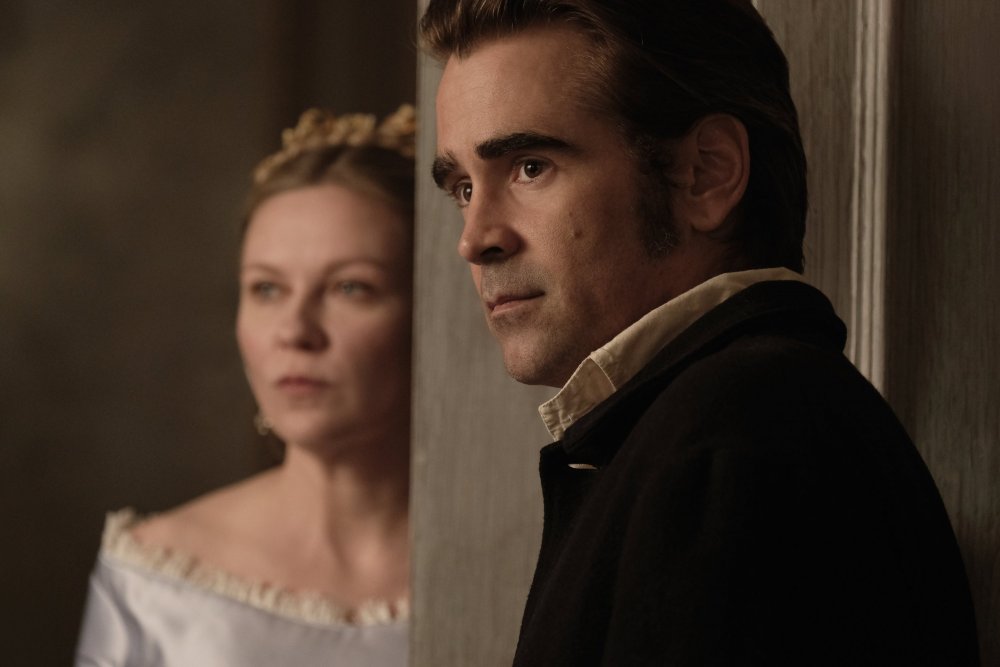 Sofia Coppola makes films about women who are trapped. Whether it is the Lisbon girls of The Virgin Suicides, Marie Antoinette, or now Edwina in her new film The Beguiled, Coppola explores the prisons women find themselves in. In this remake of a Don Siegel and Clint Eastwood film, she seems to more explicitly explore the role of men who may create these prisons.
Sofia Coppola makes films about women who are trapped. Whether it is the Lisbon girls of The Virgin Suicides, Marie Antoinette, or now Edwina in her new film The Beguiled, Coppola explores the prisons women find themselves in. In this remake of a Don Siegel and Clint Eastwood film, she seems to more explicitly explore the role of men who may create these prisons.The man at the center of this exploration of what women want from men and vise versa is Colonel John McBurney (Colin Farrel). He is a found wounded by young Amy (Oona Laurence). The setting is the Civil War. He is from the North and the boarding house he is taken into is in the South. The young women who surround him refer to him as a "blue-belly." Headmistress Miss Martha (Nicole Kidman) is cautious and unsure at first. Schoolteacher Edwina (Kirsten Dunst) fall for his charm's quickly and is the first to express some possession of him to the other girls.
This notion of possession is a powerful one in the context of The Beguiled. Alicia's (Elle Fanning) budding sexuality leads her to make the first physical move on the Colonel. This sets in motion a series of events where Martha, Alicia and Edwina all seems to stake a certain possession of the Colonel and what he represents. He may be the externalized prisoner but Coppola complicates the gender dynamics here and suggests that he may not be the only one trapped within the walls of the boarding school.
Sofia Coppola continues to develop as a director and The Beguiled features her most powerfully constructed scenes. The scenes both center around the dinner table. In these scenes, every character's motivation and position is understood. Everything Coppola is doing different from the Don Siegel version is present in these scenes. They are true masterworks and make The Beguiled one of the better films of 2017 thus far.
Philippe Le Sourd's stunning soft-focus cinematography will remind many of the natural lighting wonders of Barry Lyndon. His delicate lighting and camera framing wisely disguises the prison-esque setting of the boarding school. We learn that these woman are alone and that no one is coming to sweep them away or change how they spend their days. Miss Martha is strict about the girls' lessons but it is never clear what they are preparing for. The war has robbed them of a normal womanhood. This makes the Colonel's presence a catalyst for themes of modern feminism to be explored. While Siegel clearly put the man in power, Coppola has reversed the sides.
This is most clear with the character of Edwina. Coppola and Dunst create a tragic character not unlike the characters they have shaped before. Here, however, there is a glimmer of escape and hope with Edwina. Unlike the Lisbon Girls or Marie, Edwina sees a future beyond the walls she finds herself in.
4/5
This is most clear with the character of Edwina. Coppola and Dunst create a tragic character not unlike the characters they have shaped before. Here, however, there is a glimmer of escape and hope with Edwina. Unlike the Lisbon Girls or Marie, Edwina sees a future beyond the walls she finds herself in.
4/5

No comments:
Post a Comment